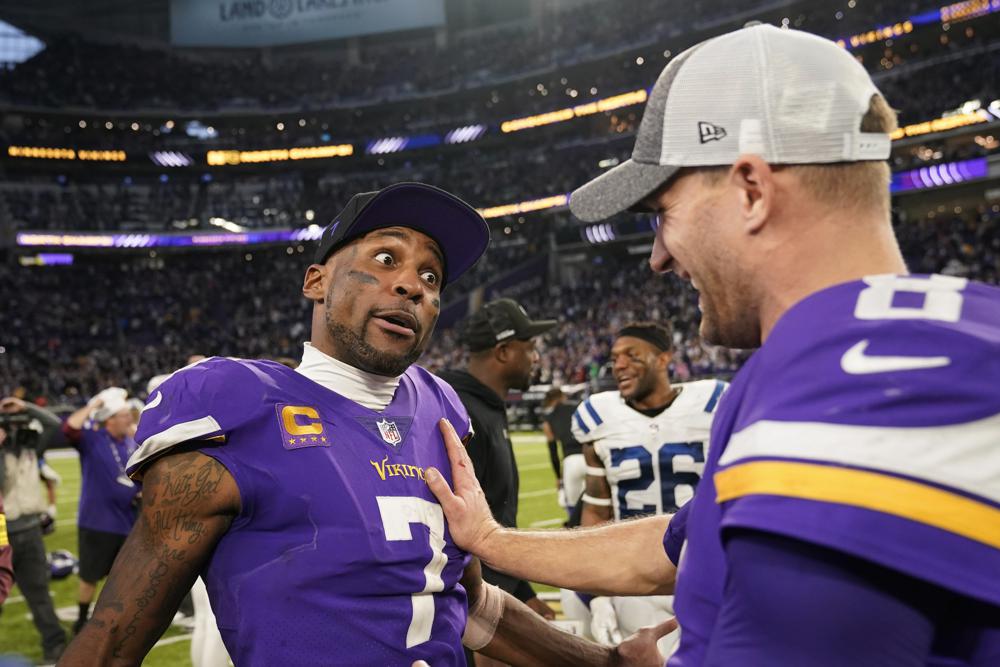
MINNEAPOLIS (AP) — Kirk Cousins interrupted the beginning of the television interview that was being shouted above the euphoric uproar in Minnesota, incredulously repeating his question to the reporter to make sure he had the details right.
Yes, the Vikings had just completed the biggest comeback in NFL history, down 33-0 midway through the third quarter before beating Indianapolis 39-36 in overtime on Saturday.
“Something like that doesn’t happen to average people,” Cousins said later.
Inside the raucous locker room at U.S. Bank Stadium, eighth-year linebacker Eric Kendricks wiped away tears as he reflected on the spirit, resiliency and camaraderie of a team that has won 10 games by eight points or fewer this season.
Rookie head coach Kevin O’Connell stepped off the podium following his media session in a fog of satisfaction and exhaustion, reflecting on cornerback Patrick Peterson’s straight-faced halftime challenge to the offense — “You just need five touchdowns” — that helped set the tone.
“I’ll never forget it as long as I live,” O’Connell said.
Buffalo’s erasure of a 35-3 deficit to beat Houston 41-38 in overtime of their wild card round playoff game after the 1992 season stood as the previous record, and though Cousins was only 4 years old at the time he’s enough of a fan of the game to have seen the rebroadcasts and read the recaps to hold full reverence for that rally led by Bills backup quarterback Frank Reich.
“That one still to this day, I wonder, “How did that happen?” Cousins said.
There might not be as much mystery around Minnesota’s version once the next generation gets up to speed on the game. The comeback has become a common feature of the NFL these days.
Cincinnati and Jacksonville each rallied from 17-point holes to win on Sunday, the first time three teams have registered comeback victories of at least that size in the same week. Three other clubs won despite fourth-quarter deficits.
The NFL has had 44 games this season with a team trailing by 10 points or more that wins or ties, including four instances by the Vikings. That’s the most in league history through 15 weeks. Clubs that have been behind at any point in the fourth quarter have come back to win or tie 71 times, also an NFL record to date.
The game now is simply more conducive to teams scoring more quickly and more often, through the evolution of the players, rules and coaches.
The best quarterbacks are continually advancing athletically and strategically, and these biggest stars of the sport have enjoyed increased protection for years with defensive players more strictly penalized for their endangerment. The receivers are more likely to draw a flag for pass interference or a hard, high hit than the guys covering them on the other side. Even the kickers have stronger and more accurate legs to make midfield a green light for late field goal tries in many situations.
Consider how the Vikings got this done against the Colts.
Dayo Odeyingbo tackled Jalen Reagor for a 5-yard loss on a jet sweep that would’ve given the Vikings second-and-15 from their own 20 with nearly 5 minutes elapsed in the third quarter. But Odeyingbo briefly stood over Reagor in an intimidating manner that was whistled for a 15-yard taunting penalty, one of the NFL’s recent emphases on sportsmanship. Two plays later, Cousins connected with K.J. Osborn for a 63-yard pass that set up the first touchdown.
Two possessions later, Justin Jefferson drew an unnecessary roughness penalty on safety Rodney Thomas during a reception for a first down that moved the ball from the Colts 48 to the 33. The Vikings were in the end zone four plays later.
Midway through the fourth quarter, Zaire Franklin was flagged for pass interference on Osborn to give the Vikings the ball at the 1. Three plays later, they scored to close the gap to 36-28.
For all the mistakes the Vikings made in the first half to fall behind by so much, O’Connell had his best play-caller hat on after halftime. Then there’s the acumen Cousins displayed in zipping the ball all over the field to fuel the rally, with 417 passing yards over the second half and overtime.
Like most of the league’s top offenses, he had five dangerous receivers to throw to on just about every play down the stretch with Jefferson, Osborn, Adam Thielen, tight end T.J. Hockenson and running back Dalvin Cook. Jefferson is in a class by himself, with his mix of route-running mastery, field-stretching speed, vice-grip hands and old-fashioned toughness to absorb hit after hit.
“I think it just highlighted in the short amount of time our team’s ability to come together and find a way when things got very difficult — and they were as difficult as they’ve been all season,” O’Connell said.
